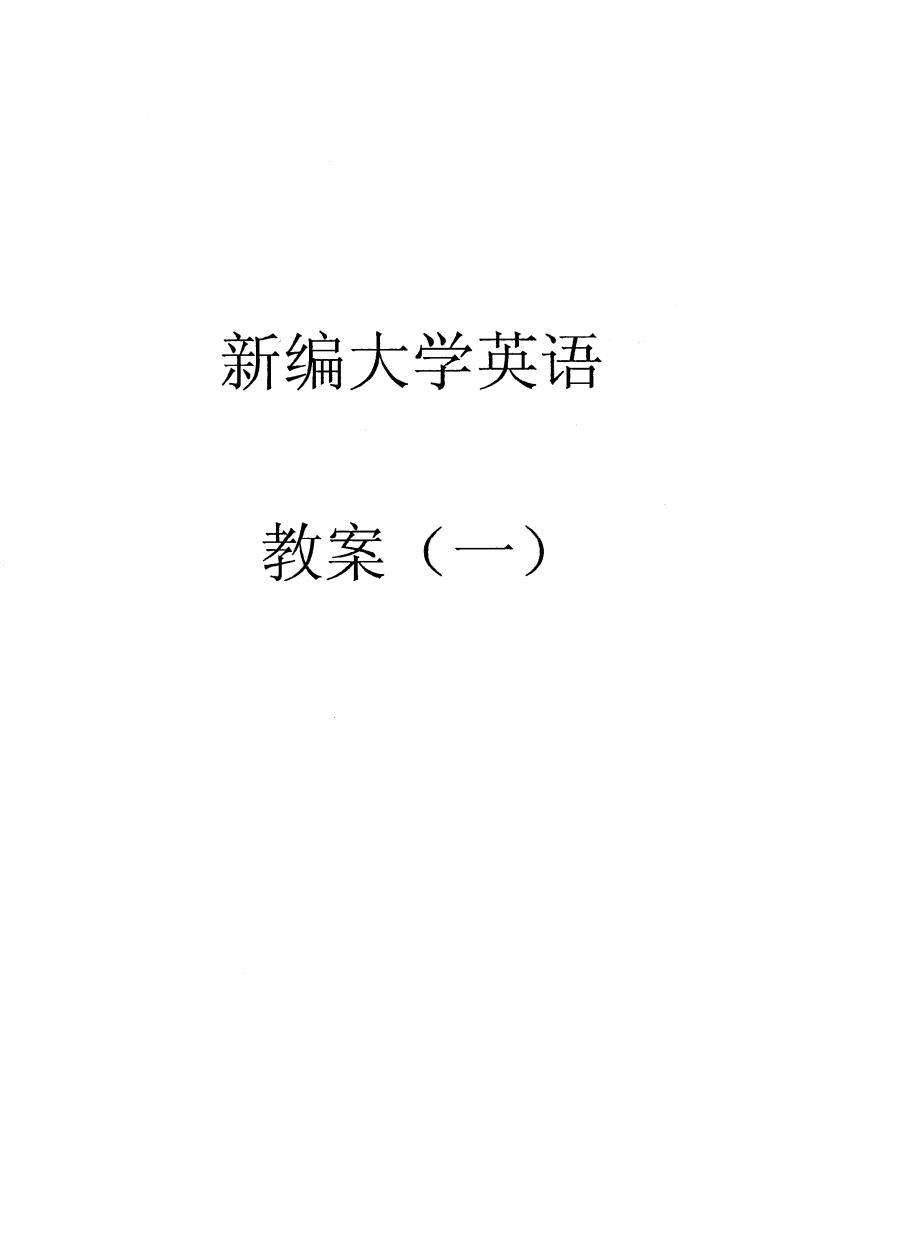
新编大学英语 教案(一)
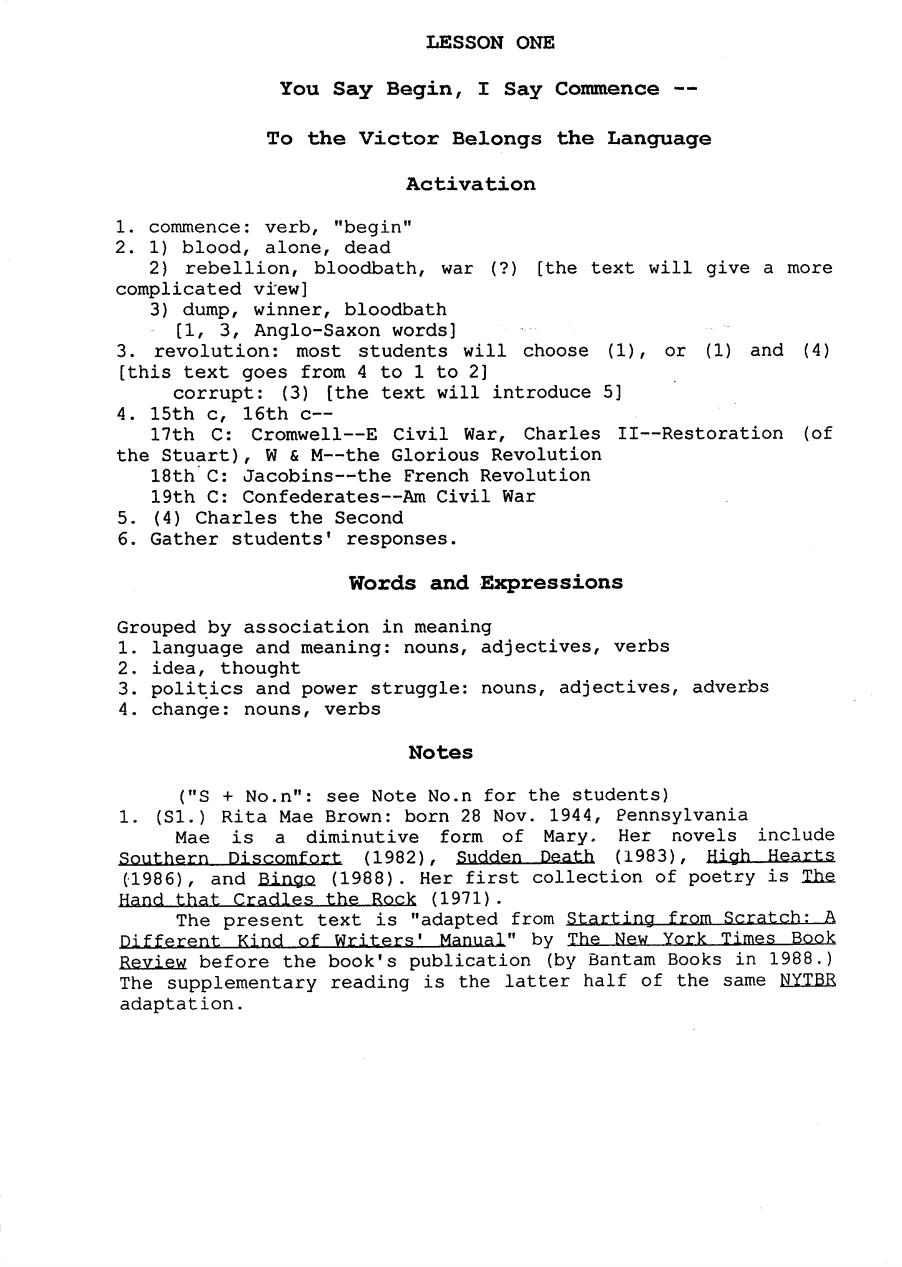
LESSON ONE You Say Begin,I Say Commence - To the victor Belongs the Language Activation 1.commence:verb,"begin" 2.1)blood,alone,dead 2)rebellion,bloodbath,war (?[the text will give a more complicated view] 3)dump,winner,bloodbath [1,3,Anglo-Saxon words] 3.revolution:most students will choose (1),or (1)and (4) [this text goes from 4 to 1 to 2] corrupt:(3)[the text will introduce 5] 4.15thc,16thc-- 17th C:Cromwell--E Civil War,Charles II--Restoration (of the Stuart),W&M--the Glorious Revolution 18th C:Jacobins--the French Revolution 19th C:Confederates--Am Civil War 5.(4)Charles the Second 6.Gather students'responses. Words and Expressions Grouped by association in meaning 1.language and meaning:nouns,adjectives,verbs 2.idea,thought 3.politics and power struggle:nouns,adjectives,adverbs 4.change:nouns,verbs Notes ("S No.n":see Note No.n for the students) 1.(S1.)Rita Mae Brown:born 28 Nov.1944,Pennsylvania Mae is a diminutive form of Mary.Her novels include Southern Discomfort (1982),Sudden Death (1983),High Hearts (1986),and Bingo (1988).Her first collection of poetry is The Hand that Cradles the Rock (1971). The present text is "adapted from Starting from Scratch:A Different Kind of Writers'Manual"by The New York Times Book Review before the book's publication (by Bantam Books in 1988.) The supplementary reading is the latter half of the same NYTBR adaptation

2.Notice the use of "can"in the following sentences:it expresses possibility in an abstract way,unlike "may/might/ could"which mean "perhaps"(that is,talking of possibility in a more realistic way). It can sweep by your ear and ..suggest hidden meanings, preconscious associations.(11.7-9) This can yield amusing results.(1.28) It can be dismissed as a rebellion.(11.33,34) 3.(S2.) 1)that was how it was used--that:the previous sentence, "revolution"means a turning around (notice "means":it is still used in this sense today). paraphrase:a turning around was the sense in which the word "revolution"was used (in the 14th century);a turning around was what the word "revolution"meant (in the14 th century)· You can recast that to mean...--that:what has just been said,i.e.,revolution was personal. 4."Revolution"means a turning around (1.18). 1)"turning"--more like a noun (as it is preceded by "a")than a gerund but not yet a full noun (as it.is still modified by an adverb "around") Can "a"be omitted here?--No.A restricts the action: (making)one complete turning--a circular course starting from one point and returning to the same point. cf."R"means turning around.(grammatically correct:The -ing phrase is object of the sentence.)The emphasis is on the action,or the concept of turning around (and around and around). 2)"around"adv.esp in AmE,="round"(in BrE) Around can be used in several senses:so as to move in a circle;so as to face the opposite direction,etc. cf.'turnabout (1.42)n.an act of turning in a different or opposite direction (about-face:.in AmE,a noun meaning a complete change to the opposite position,direction or opinion) 3)Also notice:a renewal of war (11.25,26),a resistance to lawful authority (11.27,28)(anact of making war again of resisting...). Without a,the emphasis will be on the concept rather than one such action. 5.(S3.)loaded:a loaded question,a loaded statement 6.(S4.) l)as(a very formal use),does(apro-verb,代动词)

e.g.The word "war"carries cultural as well as political meaning,as does "peace". "Love"is an Anglo-Saxon word/old English word,as are "help"and "begin". 2)We will often come across "pool"in later texts.So at present,concentrate on this one use in the text. In English there are two words spelt "pool",but they are different not only in meaning but also in origin.One "pool"(a pond,a puddle,or a swimming pool)comes down from old English,and the other "pool"enters English from Latin through French.It means essentially a putting together of things (money,goods,workers,etc.)for some common purpose or for common use,or (as in "word pool")a common supply of things. *S5 (this)--see below,10 7.(S6.)Whichever side won called the losers rebels --they, the winners,being the repositories of virtue and more gunpowd- er. 1)paraphrase:No matter which side won the war,the winners called the losers rebels as they now came to represent what was good and right and lawful as well as power and authority. 2)The participle phrase (being)indicates cause,but the dash suggests something added afterwards,a deviation from the original definition of the word (redefining). 3)ironic juxtaposition of virtue and gunpowder more gunpowder:stronger,more powerful,actually the cause of their being able to redefine language and to call the other side rebels ("virtue":suspicious?) "amusing results"(1.28):language of conquerors 4)repository:storehouse (place,concrete)of virtue (quality,abstract) cf.the road map (image)of a culture (more abstract) 5)"whoever wins the war"--also a subject clause, whoever.anyone who (anyone,no matter who),or any side that (any side,no matter which) e.g.Whoever has played with a tarot deck knows the image of the wheel of fortune well. 8.Since the North won that war,it can be dismissed as a... (11.33-35) since conj.indicating cause (used only of known facts) e.g.They now call themselves lawful since they won the war and have since (adv.indicating time)been in power. 9.(S7.)Jacobins--members of a society of radical democrats in France during the Revolution of 1789;their meetings were held
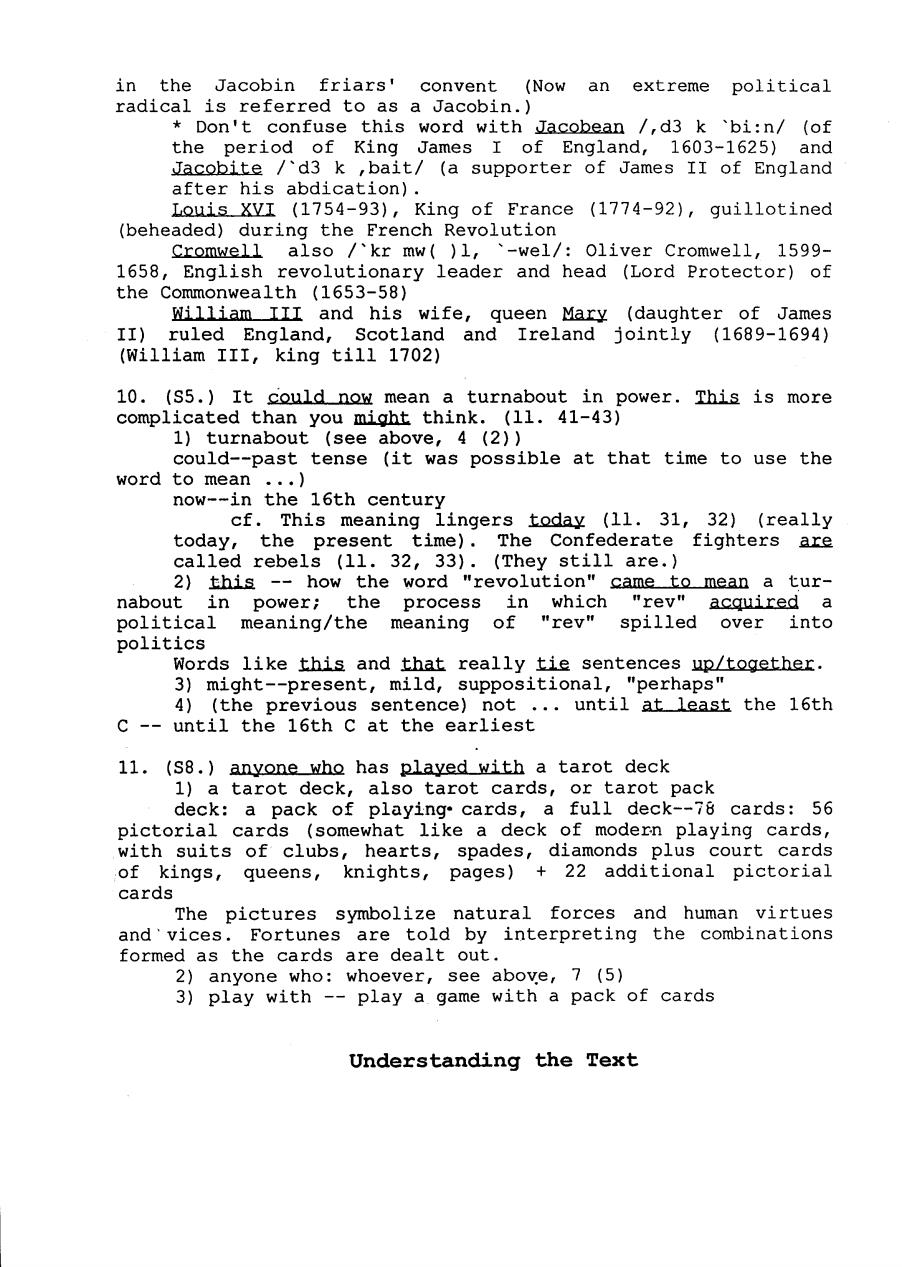
in the Jacobin friars'convent (Now an extreme political radical is referred to as a Jacobin.) Don't confuse this word with Jacobean /d3 k bi:n/(of the period of King James I of England,1603-1625)and Jacobite /d3 k ,bait/(a supporter of James II of England after his abdication). Louis XVI (1754-93),King of France (1774-92),guillotined (beheaded)during the French Revolution Cromwell also /'kr mw()1,-wel/:oliver Cromwell,1599- 1658,English revolutionary leader and head (Lord Protector)of the Commonwealth (1653-58) William III and his wife,queen Mary (daughter of James II) ruled England,Scotland and Ireland jointly (1689-1694) (William III,king till 1702) 10.(S5.)It could now mean a turnabout in power.This is more complicated than you might think.(11.41-43) 1)turnabout (see above,4 (2)) could--past tense (it was possible at that time to use the word to mean··,) now--in the 16th century cf.This meaning lingers today (11.31,32)(really today,the present time).The Confederate fighters are called rebels (11.32,33).(They still are.) 2)this --how the word "revolution"came to mean a tur- nabout in power;the process in which "rev"acquired a political meaning/the meaning of "rev"spilled over into politics Words like this and that really tie sentences up/together. 3)might--present,mild,suppositional,"perhaps" 4)(the previous sentence)not ..until at least the 16th C--until the 16th c at the earliest 11.(S8.)anyone who has played with a tarot deck 1)a tarot deck,also tarot cards,or tarot pack deck:a pack of playing.cards,a full deck--78 cards:56 pictorial cards (somewhat like a deck of modern playing cards, with suits of clubs,hearts,spades,diamonds plus court cards of kings,queens,knights,pages)+22 additional pictorial cards The pictures symbolize natural forces and human virtues and'vices.Fortunes are told by interpreting the combinations formed as the cards are dealt out. 2)anyone who:whoever,see above,7 (5) 3)play with --play a game with a pack of cards Understanding the Text

1.road map of a culture (spatial metaphor,relationships seen at a glance) where its people come from and where they are going (continuing the map image:travelling--origin,point of departure, direction,change,progress) pendulum contrasted with fixed entity similarly (not a metaphor or simile):meaning in flux (1.14)([U]continual change,condition of not being settled),shift (1.69), (of "revolution",11.40,41)meaning spilled over into politics (implicitly,liquid,something flowing,not settled or fixed) Another point:a word can have layers of meanings,literal meaning various (often hidden or preconscious)associations. 2.Latin through French;the 14th C; revolution--a turning around,used in astronomy, describing the movement of planets in space rebellion--a loaded political word,a renewal of war,used to name a resistance to lawful authority;in actual use,always a word for the losers in wars,or what winners call the losers in the 14th C,no:revolution not a political word yes:circular movement,war against lawful authority 3.[At present, do not discuss whether we should call Cromwell's action Rebellion or Revolution and other such questions. revolution rebellion 1 age events I meaningluselchangel meaningluselchange 14th C:. rev-: a turning around;applied to astronomy --no political meaning reb-: a renewal of war;a resistance to lawful authority --a loaded political word,actually what winners called the losers 16th C: sudden twists and turns of fate,life shown in the image of the wheel of fortune rev-: (original meaning)a circular movement a turnabout in power--political meaning added 17th C:Cromwell (Rev?Reb?),Restoration,Glorious Revolution rev-: a turning around
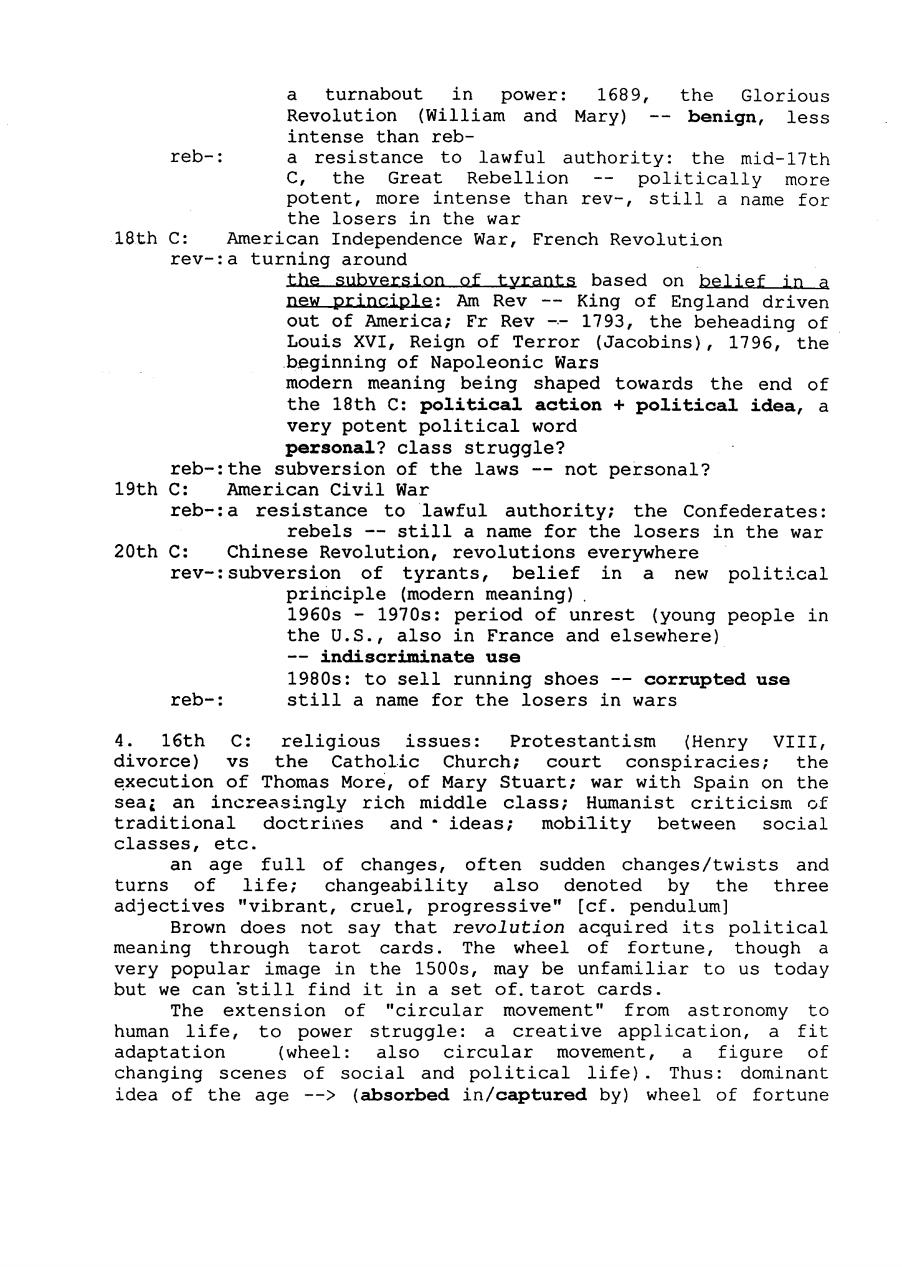
a turnabout in power:1689,the Glorious Revolution (William and Mary)--benign,less intense than reb- reb-: a resistance to lawful authority:the mid-17th C,the Great Rebellion --politically more potent,more intense than rev-,still a name for the losers in the war 18th C: American Independence War,French Revolution rev-:a turning around the subversion of tyrants based on belief in a new principle:Am Rev--King of England driven out of America;Fr Rev --1793,the beheading of Louis XVI,Reign of Terror (Jacobins),1796,the beginning of Napoleonic Wars modern meaning being shaped towards the end of the 18th C:political action political idea,a very potent political word personal?class struggle? reb-:the subversion of the laws --not personal? 19th C:American Civil War reb-:a resistance to lawful authority;the Confederates: rebels --still a name for the losers in the war 20th C: Chinese Revolution,revolutions everywhere rev-:subversion of tyrants,belief in a new political principle (modern meaning). 1960s -1970s:period of unrest (young people in the U.S.,also in France and elsewhere) --indiscriminate use 1980s:to sell running shoes --corrupted use reb-: still a name for the losers in wars 4.16thC: religious issues:Protestantism (Henry VIII, divorce)vs the Catholic Church;court conspiracies;the execution of Thomas More,of Mary Stuart;war with Spain on the seai an increasingly rich middle class;Humanist criticism of traditional doctrines and ideas;mobility between social classes,etc. an age full of changes,often sudden changes/twists and turns of life;changeability also denoted by the three adjectives "vibrant,cruel,progressive"[cf.pendulum] Brown does not say that revolution acquired its political meaning through tarot cards.The wheel of fortune,though a very popular image in the 1500s,may be unfamiliar to us today but we can still find it in a set of.tarot cards. The extension of "circular movement"from astronomy to human life,to power struggle:a creative application,a fit adaptation (wheel:also circular movement,a figure of changing scenes of social and political life).Thus:dominant idea of the age --(absorbed in/captured by)wheel of fortune
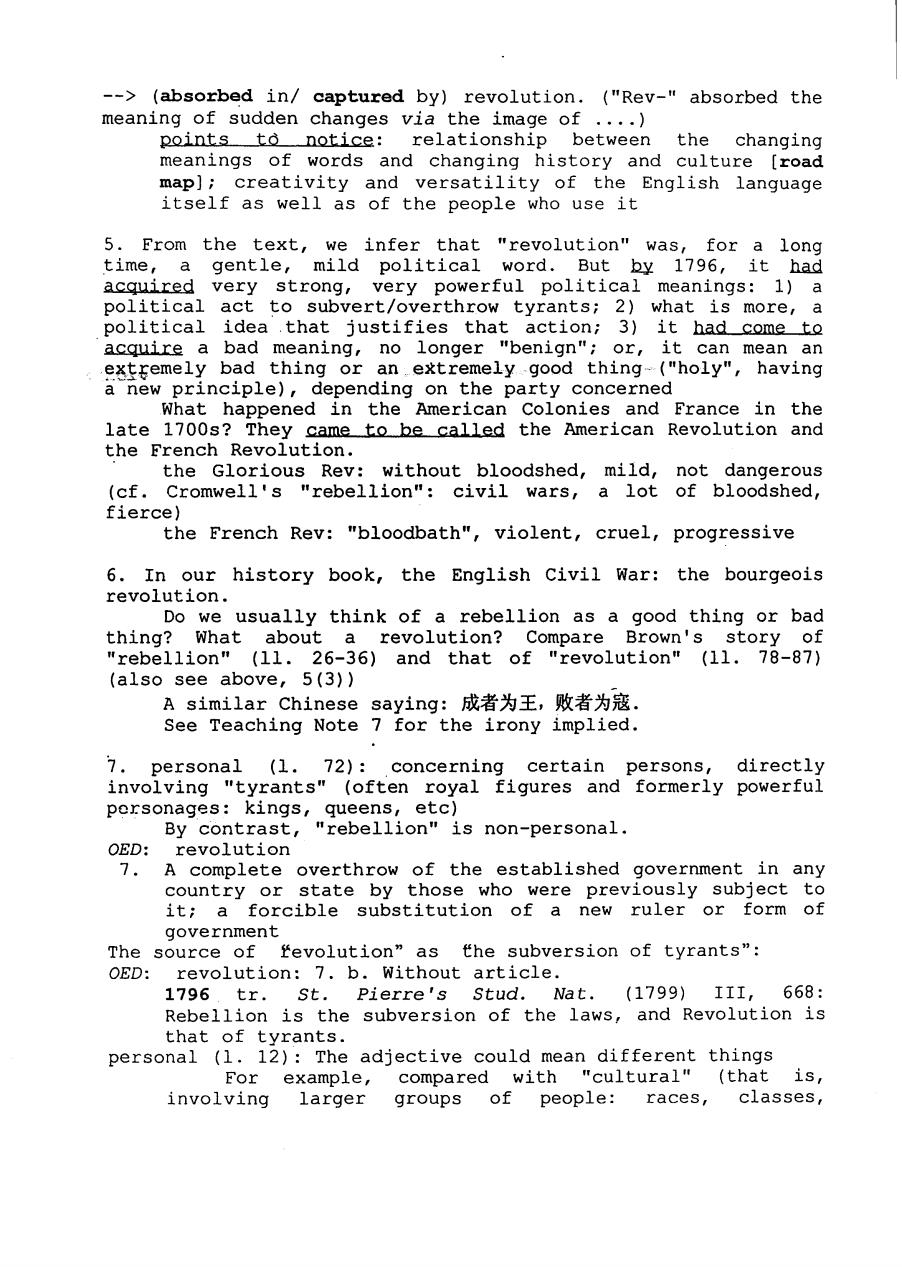
--(absorbed in/captured by)revolution.("Rev-"absorbed the meaning of sudden changes via the image of .... points to notice:relationship between the changing meanings of words and changing history and culture [road map];creativity and versatility of the English language itself as well as of the people who use it 5.From the text,we infer that "revolution"was,for a long time,a gentle,mild political word.But by 1796,it had acquired very strong,very powerful political meanings:1)a political act to subvert/overthrow tyrants;2)what is more,a political idea.that justifies that action;3)it had come to acquire a bad meaning,no longer "benign";or,it can mean an extremely bad thing or an extremely good thing-("holy",having a new principle),depending on the party concerned What happened in the American Colonies and France in the late 1700s?They came to be called the American Revolution and the French Revolution. the Glorious Rev:without bloodshed,mild,not dangerous (cf.Cromwell's "rebellion":civil wars,a lot of bloodshed, fierce) the French Rev:"bloodbath",violent,cruel,progressive 6.In our history book,the English civil War:the bourgeois revolution. Do we usually think of a rebellion as a good thing or bad thing?What about a revolution?Compare Brown's story of "rebellion"(11.26-36)and that of "revolution"(11.78-87) (also see above,5(3)) A similar Chinese saying:成者为王,败者为寇. See Teaching Note 7 for the irony implied. 7.personal (1.72):concerning certain persons, directly involving "tyrants"(often royal figures and formerly powerful personages:kings,queens,etc) By contrast,"rebellion"is non-personal. OED:revolution 7.A complete overthrow of the established government in any country or state by those who were previously subject to it;a forcible substitution of a new ruler or form of government The source of fevolution"as the subversion of tyrants": OED:revolution:7.b.Without article. 1796.tr.St.Pierre's Stud.Nat.(1799)III,668: Rebellion is the subversion of the laws,and Revolution is that of tyrants. personal (1.12):The adjective could mean different things For example,compared with "cultural"(that is, involving larger groups of people:races,classes

countries,etc,habits,ideas,values,principles), "personal"is private,individual,specific,concerning one's own experiences,reactions and feelings. Free discussion.Possibly:personal (1.72),murder (1.75),a nation devouring itself (11.76,77),bloodbath (1. 79),etc.The dispute over the naming of a historical event is very often not just a matter of personal feelings or opinions. 8.indiscriminately:not (used)strictly in its original sense, (used)carelessly--what was called a "rev-"did not end in the overthrow of tyrants or a change in power structure corrupted:(past participle of "corrupt"vt.)changed in a bad way,different from the original -to sell running shoes, "revolution"marking the change of fashion and style,anything fancy,new --no political meaning attached commercials 9.Free discussion.One sentence is omitted from the first paragraph:(..versatility.)It is the language of survivors, of conquerors,of laughter.(survivors,conquerors --to be dealt with in the supplementary material) a historical,cultural and humanist view of language:1) meaning constantly changing,developing,a never ending process;2)new meanings derived from human activities, political,cultural,etc,3)multi-meanings of words,rich associations (historical,political,cultural,personal, emotional ..)all contained,hidden,buried in words,4) words are like living beings,one can hear,see,smell,taste, feel,touch,embrace them;words are ourselves,not just "tools"("pendulum":a bit too mechanic?)... 10.1)come from,enter (via),(origin n.), 2)indicate,reveal,suggest,describe, illustrate, (explanation n.) 3)mean,carry,tie to (1.40),linger (1.31) 4)acquire,absorb,capture,yield (? come to mean,develop (into),spill (over into), redefine,recast, corrupt (ed) 5)use,apply (to),dismiss (as)(?),call/tag (n. n/adj.),(Two Rivers:draw from (a pool) Exercises I.Pronunciation and Spelling. 1.dr m,dr 'm tik;di'm kr si,dem'kr tik; reb()1 (if a verb,ribel),ribelj n; :-,:`riti,or`-r-;
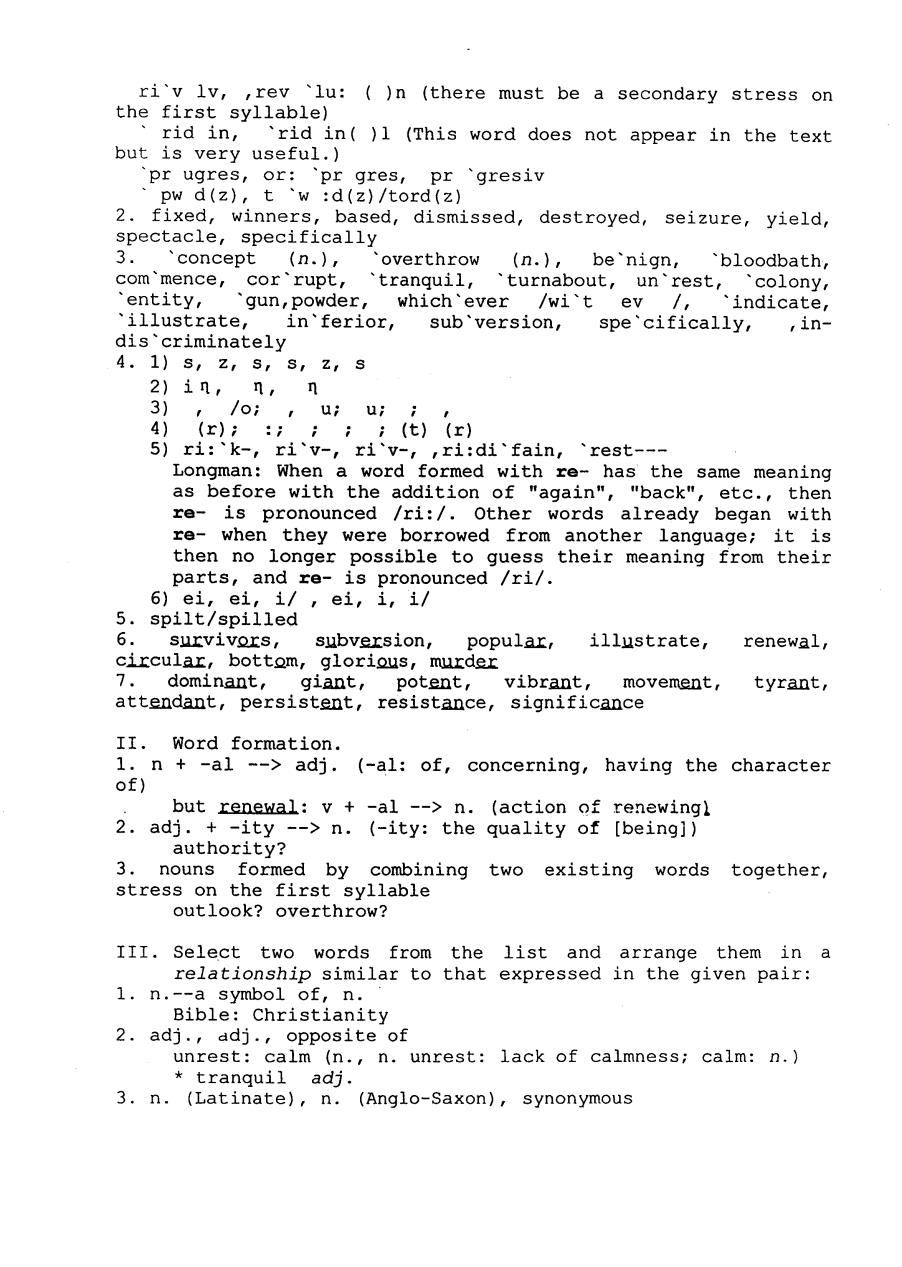
、 ri'v lv,,rev lu:()n (there must be a secondary stress on the first syllable) rid in,rid in()1 (This word does not appear in the text but is very useful. pr ugres,or:pr gres,pr gresiv pw d(z),tw d(z)/tord(z) 2.fixed,winners,based,dismissed,destroyed,seizure,yield, spectacle,specifically 3.concept (n.),overthrow (n.),be'nign,bloodbath, com'mence,cor'rupt,tranquil,turnabout,un'rest,colony, 'entity,gun,powder,which'ever /wi't ev /,indicate, illustrate,in'ferior,sub'version,spe'cifically,,in- dis'criminately 4.1)s,z,s,s,Z,s 2)in,n,n 3),/o;,u;u;;., 4)(r);:;;;;(t)(r) 5)ri:k-,ri'v-,ri'v-ri:di'fain,rest--- Longman:When a word formed with re-has the same meaning as before with the addition of "again","back",etc.,then re-is pronounced /ri:/Other words already began with re-when they were borrowed from another language;it is then no longer possible to guess their meaning from their parts,and re-is pronounced /ri/. 6)ei,ei,i/ei,i,i/ 5.spilt/spilled 6.survivors,subversion,popular,illustrate, renewal, circular,bottom,glorious,murder 7.dominant,giant,potent,vibrant,movement,tyrant, attendant,persistent,resistance,significance II.Word formation. 1.n +-al --adj.(-al:of,concerning,having the character of) but renewal:v -al --n.(action of renewingl 2.adj.+-ity --n.(-ity:the quality of [being]) authority? 3.nouns formed by combining two existing words together, stress on the first syllable outlook?overthrow? III.Select two words from the list and arrange them in a relationship similar to that expressed in the given pair: 1.n.--a symbol of,n. Bible:Christianity 2.adj.,adj.,opposite of unrest:calm (n.,n.unrest:lack of calmness;calm:n. tranquil adj. 3.n.(Latinate),n.(Anglo-Saxon),synonymous